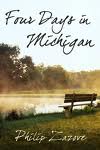 Charity Nebbe (2010-06-03)
Charity Nebbe (2010-06-03)
Michigan Radio
ANN ARBOR, MI (Michigan Radio) – The new novel “Four Days in Michigan” by Philip Zazove is about a young deaf woman in Michigan who falls in love with a soldier home on leave. It takes place in the lead up to World War II and it explores the vast divide between Deaf culture, with a capital D, and the hearing world.
The author knows a great deal about this divide. He was the first deaf person mainstreamed in public schools in the suburbs of Chicago and he went on to become one of the nation’s first deaf doctors. He is a professor in the Department of Family Medicine at the University of Michigan. He spoke with Michigan Radio’s Charity Nebbe.
CN: Dr. Zazove your novel is a love story, but in addition to telling that story you spend a lot of time having the characters explore the differences between deaf people and hearing people. What do you want your readers to learn about deaf culture?
PZ: Having a hearing loss whether you are part of the deaf culture or hearing society like most deaf people, it’s still the same. It’s the communication gap in particular between people who hear and people who don’t. For many reasons, one is the people who don’t hear don’t develop a language. I know English very well, but many deaf people don’t. Most deaf people will not tell you they are deaf. So unless you really understand that there is a divide there you never know because nobody will admit to it.
CN: In your novel your main character was very frustrated because of the discrimination she’d faced. She wanted to be a veterinarian and it didn’t look like that could happen for her because she continued to be rejected by institutions that didn’t think a deaf person could become a veterinarian. But she also is very quick to feel angry when people in the hearing world don’t understand her or feel sorry for her. Why is she so angry?
PZ: Probably because that’s how I think most people with profound hearing loss feel. I have several friends who are deaf who get so upset at things like that. Even though they are not young people they’re in their 30’s 40’s and 50’s. After awhile it just gets on you, again and again and again.
CN: So you grew up in a hearing family and you went to school with other hearing students. Was it difficult for them to understand what you were going through?
PZ: I don’t think anybody can understand unless they go through it. I think my parents tried and my friends tried to understand. They empathized but I don’t think they truly understand it.
CN: You have overcome so many obstacles to be where you are in your life. And you write about a time right before World War II when there were not options for deaf people. There was one deaf university and there still is Gallaudet University. But for a deaf person to enter and compete in the hearing world it was almost impossible back then. Do you feel like the playing field has been leveled? Do deaf people have the protections that they need today?
PZ: We’ve made a lot of progress particularly since the ADA, the Americans with Disabilities Act in the 1990’s. It’s not level, by an stretch of the imagination. Part of it is the Deaf communities that everyone talks about, the people who sign who are proud and they let you know. The vast majority of people with profound hearing loss are very embarrassed and they will not admit it even if you ask them. We’ve had medical students come through the university who have severe hearing loss and they all deny it. So it’s better but it’s not level. And don’t know how to make it level. I struggle with that. I think, like any form of discrimination, it just going to have to keep working away and chipping away and making it better and better ever time.
CN: Dr. Zazove, thank you so much.
PZ: Thank you for having me.
© Copyright 2010, Michigan Radio




